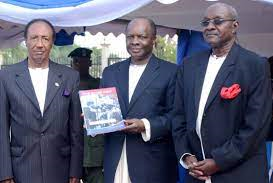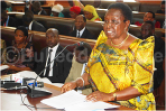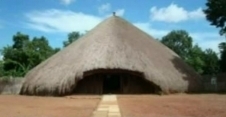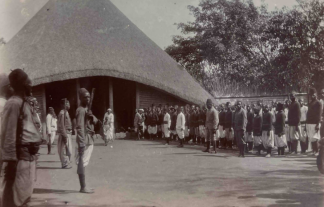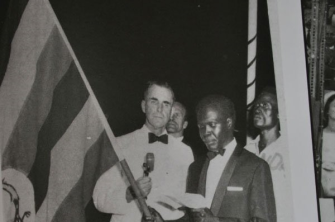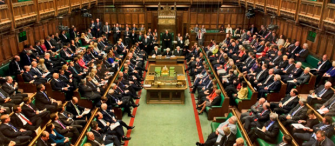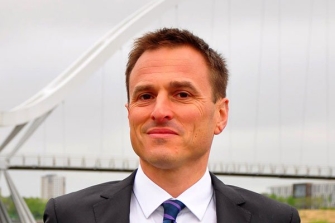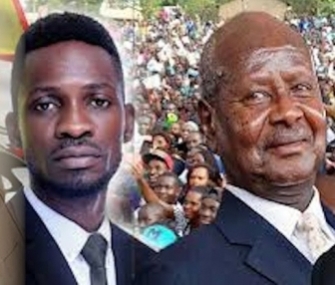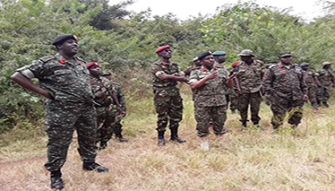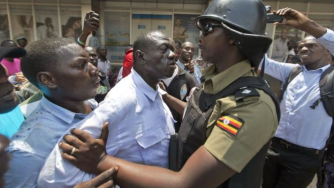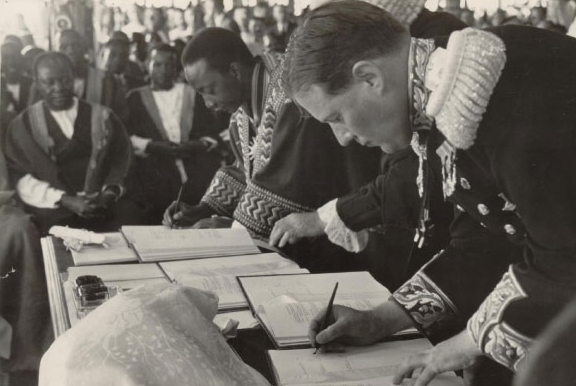
President Yoweri Museveni with his gun
For at least 33 years, February 6 is celebrated annually. General Museveni's emphasis on military capability connects Tarehe Sita to another historical event, 53 years ago, that might be a major factor in the militarisation of Uganda's politics. In the second and final part of our series, we revisit some of the events of 1966 that laid the foundation for successive leaders to always turn to the military to answer questions of political nature.
Foreign Affairs minister Sam Odaka and John Kakonge, a specially elected legislator, tried in vain to turn the political tide. In the end, only Kakonge opposed the motion. As the motion sailed through parliament and Amin was sent on leave, Prime Minister Obote returned to Kampala.
Odaka's Creed
Sam Odaka, Foreign Affairs minister and member of parliament from Tororo, began his submission by hitting at some of his cabinet colleagues whom he accused of treachery. He coined what he called "Odaka's creed."
"I believe in government, and in its being quite decent, condoning no corruption, condoning on criminal acts, carrying out its full duties and responsibilities, collectively and justly. I believe that ministers who find the cabinet motto, "One for All and All for One" unacceptable to them, must resign at once from it."
Odaka was directing his "creed" at ministers Balaki Kirya, Emmanuel Lumu, Mathias Ngobi, Grace Ibingira and George Magezi. This forced Dr Lumu to respond: "Many members of this House asked us to resign quickly, from the Uganda cabinet…Why should we? What is wrong with this motion? It has not censured the Premier, it censured not cabinet, it gives none of you a cause to call for the resignations of some of your ministers who resolved to accept it."
But Odaka had turned his gun and pointed it to the mover of the motion, Daudi Ocheng. "Ocheng has accused so far seven outstanding persons of the crime of corruption. These are minister Lumu and minister Ngobi, Mr Roger Mukasa, chairman of the Coffee Board, and Kalangi Ntende, chairman of Lint Marketing. And, today, the Prime Minister and two of his ministers."
Odaka argued that Ocheng's allegations were not backed by any written complaints nor by any affidavits, noting: "Corruption exposure is now Ocheng's speciality. I do not grudge him the job, but I would like to ensure that he does that good job well by following simple rules and elementary steps of reporting any crimes. The machinery is here, why then does he not use it? Is he afraid …that a libel case would be brought against him?"
Odaka chided Ocheng for using parliamentary immunity to destroy other people's characters. "He prefers parliamentary freedom and immunity to protect him from his trade - trade of assassinating character, and all good names," Odaka said.
Summing up his submission, Odaka said: "Go ahead Mr Ocheng. Ply well this tough trade of yours, your target is now in sight. Charge a few more ministers of corruption and bribery, and most ministers would be corrupt according to you. That would be the very time to change government at once…"
Odaka was a strong UPC pillar and confidant of Obote in the 1960s and 1980s. As foreign affairs minister from 1962 and 1971, Odaka played a leading role in organising the visit of Pope Paul VI to Uganda in July 1969, the first papal visit in Africa. As Mutesa lived on handouts in exile from 1966 until his death in 1969, Odaka was the face and voice of the Obote I government as it took a hard-line stance, denying the Kabaka access to financial resources.
Later, in the Obote II government between 1981 and 1985, Odaka served as Planning and Economic Development minister until Obote's overthrow in July 1985. He died in August 2015.
Country going to the dogs, heading for trouble
John Kakonge, the only legislator to unequivocally oppose the motion, had lost his secretary general's docket to Ibingira at the 1964 UPC delegates conference in Gulu. Ironically, Obote had outmanoeuvred Kakonge in support of Ibingira during the conference. In 1965, Kakonge became a specially elected member of parliament, this time with the backing of Obote and with Ibingira opposing him.
During the debate, Kakonge called on his colleagues to have clarity of mind. "Clarity of mind is what we need most right now. Though the motion charged Amin of alleged grave misconduct…the mover charged the premier and two of his ministers of corruption and of plots to overthrow, by violence, the Uganda constitution," Kakonge submitted.
He added: "What does this really entail? Might acceptance of motion not imply that this very House has accepted accusations against our premier and two of his ministers?"
He cited what he called abnormal behaviours, unusual practice and the strange things going around as causes for concern. "Thus for the first time this House has seen ministers clash here. It has seen ministers talk and reveal what they should not. Judging by the trend of these unusual occurrences, we are going to the dogs, we are heading for trouble," warned Kakonge,
Opolot, not Amin bringing trouble
Kakonge accused Army commander, Brigadier Shaban Opolot, not his deputy Col Idi Amin, of plotting to topple the government. "Punishing Col Amin will not solve any trouble. I have heard other versions of what is to bring trouble. It is not Col Amin but Brigadier Opolot, commander of the army," he said.
He added that a group of ministers were supporting Opolot and that they regarded Amin as a stumbling block. Kakonge went on to downgrade the debate as of the lowest standard characterized by rumours, hearsay and falsehoods. Just like Sam Odaka, Kakonge warned of trouble ahead unless government took firm steps to arrest the situation.
"I can see with my mind's eyes; troubles knocking at the door, and tragedies threatening to swallow all of us up…Only one thing can save us: firm and very firm action by the Uganda government, to whom I now say this much: Stop these plots and counter-plots."
Without mentioning names, Kakonge warned of foreign elements working with local leaders to undermine the government. "Mark my words about these plots, they are not of native birth but born and bred by aliens, executed by some of us who rather unwittingly got involved with those aliens. It might yet not be too late, for them to defy aliens," he said.
He asked those involved in plots and counter-plots to reflect on the repercussions of their actions. "It will sober you a bit: if we have disturbances, we have a civil war, all of us will be involved; none might escape its consequences. Any life which may be lost, any property destroyed might be yours, or might be mine. Nothing should, therefore, stop us from working as a unit, for our preservation; for safety of property and the welfare of this dear land," Akena Adoko quotes Kakonge on page 53 of his book, The Uganda Crisis.
Do you think at all?
Kakonge called for dialogue to address the issues at hand. He posed reflective questions to the House: "Must we wash dirty linen publicly and outrageously? Must we shout all our sins from roof-top to roof-top? Can't we sit round a table and discuss things responsibly? Do you members think at all? Do you think before you speak? Can you weigh the great damage that has been done to this land by your thoughtless utterances of corruption and a coup by our prime minister? Do you know the motivation for Ocheng's accusations against our premier? We will have no unity when we do not show respect due to …our national leaders."
Pyrrhic victory
To Kakonge, Ocheng himself did not believe in his own allegations that he wanted to convince parliament to believe. He warned those who saw victory in Ocheng's motion that it was victory with no winner. "Some of us cannot see it, they take it as victory. True it is a victory, but a pyrrhic victory: for one more such victory and Uganda will be lost. It's a pyrrhic victory which teaches us one lesson: we swim or sink together. Mr speaker, I do beg to oppose the whole motion," Kakonge summed up his submission.
With Kakonge the only dissenting voice, parliament passed the motion suspending Amin and directing an inquiry into his bank account. The following day, on February 5, Defence minister Felix Onama sent Amin on a short leave, not on suspension. But things moved very fast.
Phares Mutibwa, in his 1992 book, Uganda since Independence: a story of unfulfilled hopes, says Ibingira, with backing from Sir Edward Mutesa, was pushing for the control of the ruling party, and later, the government.
On page 38, Mutibwa captures it thus: "The political dispute between Obote and Ibingira and his supporters centered around the control of UPC and ultimately the very leadership of the country in terms of the political and economic ideologies that were to be followed."
While Obote preached socialism and rallied his government to "move to the left", Ibingira was a capitalist. With neither harmony in the ruling party, nor in government, Obote returned from his long tour of northern Uganda, on February 12, to take charge.
In his 1968 article, Obote says the situation compelled him to take what he called drastic actions. On February 22, 1966, some 18 days after the Ocheng motion in parliament, five cabinet ministers were arrested during a cabinet meeting. The five included Grace Ibingira, Dr Emmanuel Lumu, Balaki Kirya, Mathias Ngobi and George Magezi.
Akena Adoko, who at the time headed the General Service Unit, a Uganda government internal and external security agency, quotes Ibingira after his arrest: "Fate is a double-crosser. I was the very person who saved from being repealed, the deportation ordinance."
Opposition legislators had introduced a motion, in late 1965, seeking to repeal a colonial era law that gave government powers to detain suspects without trial. Ibingira convinced parliament not to repeal it.
Two days after the arrests, the 1962 Constitution had been put aside, replaced with an interim one that dismissed Sir Edward Mutesa as President of Uganda and Sir Wilberforce Nadiope as vice president. The same Constitution made Obote executive president. Obote addressed the press thus: "Recently, attempts were made to remove my government by the use of foreign troops…To safeguard our sovereignty, we must take counter measures: suspending the Constitution, and hence posts of president and that of vice president."
By the end of May 1966, Sir Edward Mutesa was in exile, his palace lying in ruin after a military raid under the command of Amin, who had by now been elevated to head the army. Mutesa would die three years on November 21, 1969, two days after celebrating his 45th birthday. From then on, Uganda's political problems would be solved by military means.
Brigadier Opolot was already serving time in Luzira prison, only to be released in January 1971, by Amin. Ocheng, the man whose motion started it all, died suddenly on June 1, 1966, aged 41 years. In his 2018 autobiography, Dr Martin Aliker, a veteran dentist, politician and businessman explained that Ocheng was diagnosed with cancer of the stomach shortly before he died.
Ocheng was Aliker's elder brother. His death came just eight days after the attack on, and exiling of, Sir Edward Mutesa, his closest friend and 99 days after the February 4 motion. He may not have lived for 100 years as he wished, but 53 years after the motion, its effects are still visible.
Meanwhile more promotions would come Amin's way, to Brigadier by 1969 and to Major-General by January 1971 when, using the army, he turned against Obote and overthrew him.
A young man named Yoweri Museveni watched these developments keenly as a secondary school student in Mbarara district. He would write later, in his book "Sowing the Mustard Seed", that he and fellow students began asking themselves questions about the future of Uganda. After graduating from university in Tanzania in 1970, he secured a job in President Obote's office just months before Amin's coup.
Obote had lost power through the only means he thought he had total control over - the military. The young Museveni was, meanwhile, thinking about fighting the new president.
"Amin took power on January 25, 1971 and two days later, on January 27, I had left the country to go and prepare to fight him," Museveni told a conference of judges last week, 48 years after Amin's coup and 33 years after Museveni's own military take-over of government.
By the end of 1978, Ugandans living in exile had forced their way back with the military support of Tanzania. General Idi Amin would be pushed out of power in April 1979.
The rigged elections in December 1980 that forced Museveni to pick up arms on February 6, 1981 were meant to restore order and dialogue after the brutal years of Amin's rule.
Whenever dialogue has failed to address political questions of the day, there's been recourse to the gun, from 1966 to 1971, 1979, and 1981 and beyond. President Museveni has been a student of, and then a participant in, this cycle of violence; the reason he said emphasised the UPDF capacity to defeat "whoever thinks of destabilising Uganda" on February 6, 2019.
How Daudi Ocheng gave birth to Tarehe Sita








